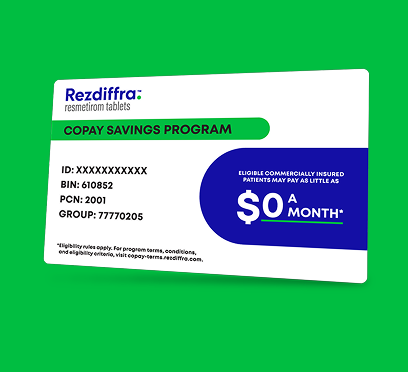

getting rezdiffra
Ask your liver specialist if Rezdiffra is right for you.
MASH was formerly called NASH (nonalcoholic steatohepatitis).
If you have MASH with liver scarring,*
find your way forward with Rezdiffra.
*With moderate to advanced liver scarring without cirrhosis, along with diet and exercise. This indication is approved based on improvement of MASH and liver scarring (fibrosis). There are ongoing studies to confirm the clinical benefit of Rezdiffra.
Why Rezdiffra
Only Rezdiffra works directly in the liver to reactivate liver cells, helping to reduce liver fat.
You can ask for Rezdiffra.
Advocating for yourself is important to getting the care you deserve. Remember, these appointments are for you. Voice your concerns and ask for what you need, even if:
Appointments are too short.
Tip: Come with a written list to share and express that you have questions at the start of your appointment.
It’s uncomfortable to question the liver specialist.
Tip: Remember that your liver specialist is a medical expert but you are the expert on you.
You’re not feeling like you know enough about a treatment.
Tip: You can share your interest in Rezdiffra and say you want to explore all options for your liver.
Advocate for Yourself

Sometimes it might feel uncomfortable to ask because you’re not sure what your liver specialist will say.
Remember, a “no” doesn’t have to be the end of the discussion, it can be an opportunity to continue a meaningful conversation. Here’s how:
Choose the statement you think you might hear from your specialist when you ask for Rezdiffra. Once selected, you’ll get guidance on how to keep the conversation going.
If I ask for Rezdiffra, I’m worried I’ll hear:
I need to lose more weight first.
I have already been given a treatment plan for my MASH.
My insurance won’t cover the cost of Rezdiffra.
How likely are you to proactively ask for Rezdiffra at your next appointment?
Move the slider and click "Submit" to select a response.
Thank you for your response
Can you tell us a bit more?
Thank you for your response
Here are some resources that can help you with the conversation.









